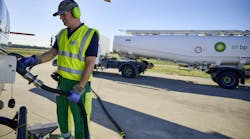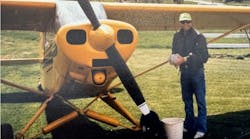Brussels, Belgium – 18 March 2013 – With a faltering economy resulting in business aviation flight activity levels in Europe down 4.3% in 2012, the sector kicked off the new year pondering, “Is the worst behind us?” This question was openly addressed during the EBAA Annual General Meeting held Friday in Brussels at the headquarters of Eurocontrol.
“There are still a number of battles to win if we are to see business aircraft flight activities return to pre-crisis rates,” said Rodolfo Baviera, EBAA Chairman. “EBAA has established a set of key priorities aimed at removing growth barriers for our sector – be they financial or operational – in order to ensure that we can continue meeting the demand for efficient, secure, point-to-point business travel.”
EBAA will train its focus on the following high-profile topics: the first relates to the campaign against illegal flights. EBAA will be working closely with European officials to develop more robust legislation to prevent and regulate illegal flight activity, and will in the coming 12 months steer a comprehensive impact assessment to illustrate the scope of illegal activities and the current difficulties for Member States to combat them efficiently.
The Association will also renew its support to the infringement procedure the Commission is mulling over against Member States’ inability to build true Functional Airspace Blocks (FABs), and will push for the review of the two lacklustre regulations on the SES performance scheme and ATM charges.
Of equal interest to EBAA will be the access to infrastructure. The Association will battle to maintain the amendments voted on by the European Parliament in the final version of the slot recast, and will as well push for a fundamental review of the way runway performance is addressed for business aviation in Europe.
With respect to environment, the Association will do its utmost so as to achieve a fairer EU ETS, by amongst others making sure distortions of competition brought in by the “stop-the-clock” derogation are confined to the minimum. Whilst collaborating with PricewaterhouseCoopers to identify ways to eliminate the unbearable admin costs endured by smaller emitters’, it will also continue to propose constructive views for the achievement of internationally-accepted Market-Based Measures (MBMs).
Finally, in order to promote best practice, the Association, in collaboration with the International Business Aviation Council (IBAC), will aim to finalise the development of an International Standard for Business Aviation Handling. Such a standard would enable the sector to conduct its own quality and safety assessment of FBOs and ground handling, and could help stimulate self-regulation from a top-down perspective, across the board.
“There’s always a ‘reaction period’ before such aeropolitical actions have a measurable impact on the bottom lines of the operators,” concluded Mr Baviera, “but helping decision-makers prioritise is particularly crucial in these tough times if the long-term resilience of the sector is to be preserved.”
About EBAA:
The European Business Aviation Association (EBAA) was founded in 1977 to defend the interests of business aviation. Today, more than 500 business aviation companies (direct members or members of associate organisations) rely on the EBAA to protect their business interests. It is the only voice to represent business aviation among the European institutions. For more information, visit www.ebaa.org.


